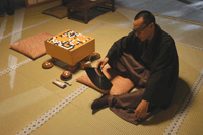|
|
||||
|
|
by Donald Levit  Following New York Film Festival screening of The Go Master/Wu Qingyuan, Tian Zhuangzhuang conferred long with his young translator before the jean-dressed Beijing director responded that, no, he had not been tempted to use snips of archival footage to flesh out context, for his story dealt with truth, “the way of spirit,” “human relationships common to all men,” and was thus supra-historical, after all. The difficulty, however, is not tied to whether or not viewers come armed with knowledge of mid-century Japanese culture or, in particular, the thinking and protocol surrounding the three-millennia-old game of go, or i-go, introduced into A lamentable truth, non-Asian viewers will be sorely pressed to differentiate, let alone keep straight, players’ faces and names. Quick cuts and brief scenes further complicate what is going on, where, with whom. In contrast, for example, Bergman does not dwell on the board, either, for The Seventh Seal knight Block’s chess challenge against Death, but the lives and the stakes are patently pictured away from that contest. Following three years’ preparation but not speaking the language or having previously worked in Japan -- hence, two “assistant directors” -- his script translated from Chinese and with mixed Chinese-Japanese crews and cast, Tian opens his film with a few seconds of his real-life hero at ninety, with wife Nakahara Kazuko, visited by the actor who will play him onscreen. Still speaking “terrible Japanese, old-style, heavily accented,” that protagonist is Wu Qingyuan (Chang Chen). Born in One hundred seven minutes do not much clarify the rest of his life, spent in Abrupt half-minutes of so many scenes prevents Wang Yu’s photography from realizing its promised serenity and beauty, just as such abbreviated segments do not allow for graphic plot progression, either. The Buddhism-Shintoism struggle and national vacuum following the collapse of Emperor worship in 1945, are touched, but not followed through on, in Jiu Kyou, the millenarian cult commandeered by self-proclaimed living goddess Jikou Son (Minami Kaho). Neither characterization nor motivation is consecutive enough to be clear. If individual and personal never gels, so, too, are outside events writ small -- a few frames of a dozen civilians running from foreground flames do not call up the firebombing holocaust; if Hiroshima did not figure in a subtitle, an interior flash would not blare August 6, 1945, nor is the viewer even made aware of a separation from Kazuko (Itou Ayumi), the reasons for it or for a later reunion, or of the fate of Shu Wen in China. Unstated rather than low-key, all is guesswork, and slow, even to a contemplated suicide whose reasons and abandonment are beyond Westerners and maybe Asians as well. (Released by Fortissimo Films; not rated by MPAA.) |
||
|
© 2026 - ReelTalk Movie Reviews Website designed by Dot Pitch Studios, LLC |



